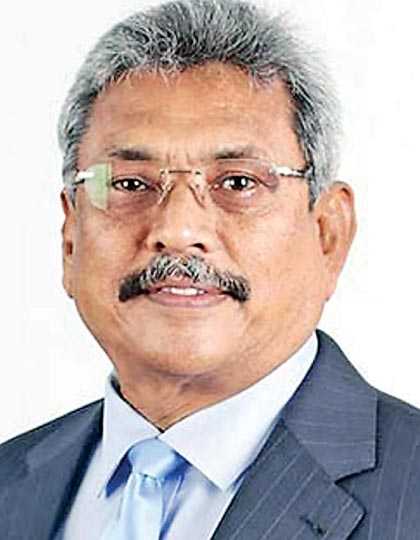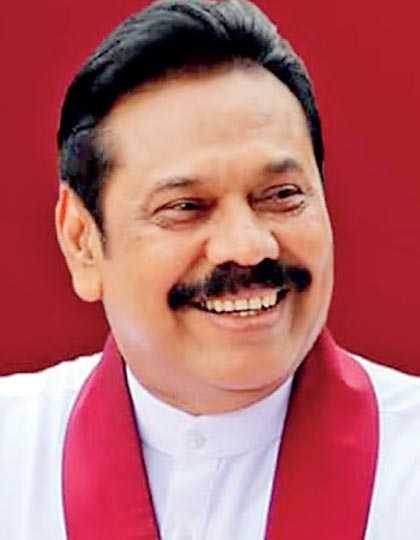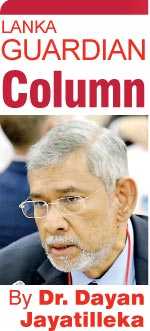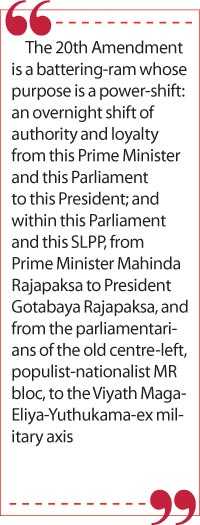Saturday Feb 21, 2026
Saturday Feb 21, 2026
Thursday, 10 September 2020 00:45 - - {{hitsCtrl.values.hits}}

President Gotabaya Rajapaksa, with little to no experience in politics and less than a year on the job, obviously sees no need to seek the advice of or even act in consultation with Mahinda Rajapaksa, arguably the most experienced politician in Asia—but only to consult him if he, President Gotabaya, is in the mood. And of course, the President can remove the PM at any time

Isn’t it ironic that MR had more powers as PM during his 52 days under President Sirisena than he will after 20A? “The powers of a peon” was Premadasa’s famously bitter description of the Prime Ministership. The 20th Amendment reduces Mahinda Rajapaksa’s powers to that or to the ornamental role of Sirimavo Bandaranaike as Prime Minister in 1994
The main problem with the 19th Amendment was not sourced in the legislation but in the illegitimacy of the political context: The Leader of the Opposition (from 2015 until 2019) was the TNA Leader who commanded only a minority of seats in the Opposition benches. Everything that was born in that Parliament was of questionable legitimacy as far as the Sinhala majority was concerned. 
There were problems intrinsic to 19A too. They could easily have been rectified by ‘keyhole’ laser surgery. Power pivoted too far from the elected President towards the PM elected on a more parochial basis. That could have been corrected. Even the inclusion of unaccountable ‘civil society’, discredited in the eyes of the people, could have been excised from the Constitutional Council. The Ministry of Defence could have been vested once again in the President. The power of the President to dissolve Parliament could have been restored to a point between the original one year and the amended four years.
There was dysfunctionality on the national security front indirectly due to 19A, but it is a lie that the Independent Commissions as such, including the Constitutional Council, were an impediment to national security. If they were, how did President Mahinda Rajapaksa win the war with the 17th Amendment in place, when earlier Presidents could not, even when untrammelled by the 17th Amendment?
The Audit Service Commission and the Procurement Commission have been deleted by the draft 20th Amendment. Doubtless a purely technocratic streamlining of administration, making for greater efficiency and cleaner government.
Instead of a rebalance through re-set, the 19th amendment has been decapitated and disposed of. The 20th Amendment is indicative of the “spirit of the laws”, the logic of the coming Constitution.
20A: Terminator presidency
If all power and decision-making are vested in one person, even if that person has originally been elected, then that political order is defined in classical (Aristotelian) terms as “the rule of one man”, a “tyranny”. In modern times this is defined as a dictatorship, especially if the ubiquity of the military is an aspect of that person’s rule, as in Sri Lanka today. Other terms, also deriving from political thought and philosophy can be used: ‘absolutism’, ‘autocracy’, ‘despotism’.
Substituting the 19th Amendment with the 20th is not merely throwing the baby out with the bathwater, it is doing so and substituting ‘Rosemary’s Baby’ or a baby by Daenerys Targaryen—one of the wee dragons that used to sit on her shoulder in Game of Thrones.
The 20th Amendment creates an absolutist Presidency. The new Constitution will construct an absolutist State.
20A is not a mere reversion to the original J.R. Jayewardene Constitution of 1978. What is happening today belongs in a different category.
Firstly, society has evolved since 1978 partly due to the great transformation set in train by the Open economy which was the real reason for the Jayewardene Constitution. President Gotabaya Rajapaksa has renounced the open economy and strongly advocates a policy of self-sufficiency and import bans.
Secondly, the need for an over-centralised presidency having lapsed, its downside having been experienced and documented in the Presidential Commission of Inquiry into the second Insurrection (the Youth Commission), the political order evolved through reforms—17A and 19A—a model which strengthened the separation of powers and was closer to the Presidency in democracies.
Thirdly, the political order is larger than the Constitution. The Jayewardene political order/model did not have anything like the studding of the state administration with ex-military and serving military officers, which under President Gotabaya constitute a new tier and stratum in the model of state. Nor was the Defence Ministry an octopus under President Jayewardene, grabbing and swallowing civilian institutions and functions (e.g. Home Affairs).
Fourthly, the Jayewardene model rested upon proportional representation which is a more accurately democratic mirror of a pluralist society than the new electoral system the Pohottuwa intends to introduce.
Fifthly, President Jayewardene never entrenched a family or clan-based oligarchy in and through his political model.
The PM’s fate
Under the 20th Amendment, the Legislature, where the elected representatives of the people—apart from the President—are, is reduced to a role a role that is purely one of making recommendations. The Prime Minister has a purely consultative role, and that too entirely at the President’s discretion.
 |
 |
President Gotabaya Rajapaksa, with little to no experience in politics and less than a year on the job, obviously sees no need to seek the advice of or even act in consultation with Mahinda Rajapaksa, arguably the most experienced politician in Asia—but only to consult him if he, President Gotabaya, is in the mood. And of course, the President can remove the PM at any time.
Isn’t it ironic that MR had more powers as PM during his 52 days under President Sirisena than he will after 20A? “The powers of a peon” was Premadasa’s famously bitter description of the Prime Ministership. The 20th Amendment reduces Mahinda Rajapaksa’s powers to that or to the ornamental role of Sirimavo Bandaranaike as Prime Minister in 1994.
The 20th Amendment is a battering-ram whose purpose is a power-shift: an overnight shift of authority and loyalty from this Prime Minister and this Parliament to this President; and within this Parliament and this SLPP, from Prime Minister Mahinda Rajapaksa to President Gotabaya Rajapaksa, and from the parliamentarians of the old centre-left, populist-nationalist MR bloc, to the Viyath Maga-Eliya-Yuthukama-ex military axis.
The President can instantly appoint a Cabinet composed entirely of his ultranationalist supporters, without a word to the PM. He can even have a snap election, dictate the nominations and pick another PM. The entire composition and complexion of the Government Parliamentary Group and Cabinet can change; be militarised. The 20th Amendment is or makes for a constitutional ‘Night of the Long Knives’ (when the Blackshirts liquidated the Brownshirts).
Why a new Constitution?
Why would the regime require an entirely new Constitution? An indication lies in the Presidential nomination of Milinda Moragoda as High Commissioner with Cabinet rank to Delhi, the statements by State Minister for Provincial Councils, Rear Admiral Sarath Weerasekara, and the inclusion of Prof. G.H. (‘Gerry’) Pieris in the nine-person team to draft a new Constitution. All three have one thing in common: pronounced hawkishness on devolution and the Provincial Councils.
Before the Presidential and Parliamentary elections, Milinda Moragoda, decades-long supporter of the US Republican Right (a Newt Gingrich fan and acquaintance of Paul Manafort) and Pathfinder boss, issued calls to all candidates to pledge the abolition of Provincial Councils.
Just recently, Rear-Admiral Weerasekara reiterated his opposition to any legislative function/capacity for Provincial Councils, attacking the 13th Amendment and the role of India, arguing that India had not fulfilled its obligations and therefore Sri Lanka was not bound by the Indo-Lanka Accord.
Prof. Gerald Pieris has long been a hardliner on devolution, opposing the Provincial Councils root-and-branch, arguing for district-level devolution and brushing off the idea that India’s view should or could be of any consequence.
Addressing a two-day workshop organised by the GMOA, President Rajapaksa declared that Education was a subject that should be vested exclusively in the centre, not shared with the Provincial Councils.
The 13th Amendment was the first structural reform to open space in the hyper-centralist Jayewardene Constitution. The new Constitution will eviscerate the core of the 13th Amendment. That gutting, accompanied by a new electoral system which loads the dice, will leave the minorities marginalised at both centre (Parliament) and periphery. Nandikadal-2009 was a historic triumph over fascistic separatist-terrorism, but a politico-constitutional Nandikadal-2020 inflicted upon the minorities would be a tragedy.
The three ‘E’s are interlinked: the ethnic, the economic and the external. Mahinda Rajapaksa used the open economy to excellent effect and in his post-war second term, the Lankan economy registered the second highest growth-rate in Asia which was the fastest growing region in the world, with Sri Lanka second only to China. Mahinda, Chamal and Basil Rajapaksa well know that the policy of import substitution/‘self-sufficiency’ of Sirimavo Bandaranaike’s administration wrecked the popularity of the 1970-’77 coalition and swept it out of office.
Why then does President Gotabaya persist in this economic policy with all the zeal of a Maoist advocating the Great Leap Forward and steel-smelting in backyard furnaces? Is there a causative connection between his economic strategy and his model for the post-war northeast, in which the Provincial Councils are divested of power over land, and in the name of “agrarian self-sufficiency” a policy of National Security Minister Lalith Athulathmudali (modelled on Israel) is revived—that of settling military and ex-military families in Northern and Eastern lands, “creating facts on the ground”, altering the very demography of (in the terminology of the 1987 Accord) “the areas of historical habitation of Sri Lanka’s Tamil-speaking people”?
Delinking from Delhi
A recent critique of the 13th Amendment by the author of ‘Gota’s War’, confidante of the book’s hero, signals the line that Colombo will take with Delhi on the issue of devolution. Disentangled, the arguments amount to the following: the 13th Amendment was modelled on the Indian system, but that system is unsuitable as a template for us because of the vast differences in scale. In any case the Indian system has better safeguards than ours does. The Indian Supreme Court once gave an interpretation on the issue of land in a manner far better than the formula in the 13th Amendment. Chief Justice Mohan Pieris gave a ruling (2013) on the subject of provincial land, that ought to be the gold standard. That’s the message. It’s not coherent or convincing.
The question of power-sharing/ethnic autonomy has been around since the Bandaranaike-Chelvanayakam Pact of 1957 (if not the Communist Party’s and its Trade Union Federation’s submissions to the Soulbury Commission). Furthermore, it isn’t true that the Indian model was the sole template for Provincial devolution. In mid-1986, returning from a risky visit to the North, socialist leader Vijaya Kumaratunga wrote to President Jayewardene urging the summoning of an all-parties roundtable to hammer out a political solution to the ethnic problem. President Jayewardene summoned the Political Parties Conference (June-July 1986).
The detailed framework agreed upon is contained in a stubby booklet issued by the Government Press. The chief drafters on behalf of the left were Dr. Colvin R. de Silva, the architect of the first Republican Constitution of 1972, and Communist leader Pieter Keuneman. The consensus arrived at was precisely for devolution of power to Provincial Councils. As PPC delegates D.E.W. Gunasekara and Vasudeva Nanayakkara can attest, India played no role and hardly figured, while the B-C Pact did.
When the Indo-Lanka Accord was finally signed and the 13th Amendment presented in Parliament by Prime Minister Ranasinghe Premadasa—who opposed the Accord and the Indian military presence but not provincial devolution as contained in 13A—there was only one difference between those texts (1987) and the JRJ-Vijaya-Colvin-Pieter proposals (1986), namely the temporary merger of the Northern and Eastern provinces.
The Indian role since the G. Parthasarathy mission was not to impose the Indian model but to bridge the gap between the Sinhala and Tamil positions. The Indian Constitution came in as an obvious reference point for the pragmatic reason of “the geopolitics of emotion” (to use a phrase of Dominique Moisi). In order to have Tamil Nadu on-board, it was necessary for Delhi to demonstrate that it had succeeded in obtaining for the Tamils of Sri Lanka a power-sharing agreement approximate/comparable to that enjoyed by the Tamils of Tamil Nadu.
Cherry-picking argumentation that the Indian Constitution has greater safeguards and powers for the centre than does the Lankan 13th Amendment is misleading and mischievous, because it ignores the realities that India is a quasi-federal state, the constituent units are linguistic states, the Indian Constitution is secular, and the (neutral) English-language has a much greater administrative/higher educational role than in Sri Lanka.
India will have to decide whether to risk a degree of the confidence it enjoys within one of its ‘grand strategic’ soft power assets, the 120 million strong ‘global Tamil’ community (including Tamil Nadu) by permitting the unilateral rewriting of the 13th Amendment in violation of the Indo-Lanka Accord, thereby consigning the Sri Lankan Tamils and their destiny to the tender mercies of Sinhala supremacism or leaving them with no choice but to seek the intercession of an extra-regional power.
From a geopolitical, International Relations perspective, Indian retrenchment/abdication in the face of Colombo’s unilateralism on the issue of the Accord and the Provincial Councils, which “the Government of India promises to underwrite and guarantee” (1987), will politically and demographically weaken the community of ‘ethnic-kin’ abutting India’s southern cone state, Tamil Nadu, losing Delhi a countervailing sphere of influence in the north of this neighbouring island astride vital sea-lanes to the south of the subcontinent—the benefit of which retrenchment/abdication will accrue to the rival power exerting pressure on its northern tier.
Finally, what is decisive is how the matter will be perceived by Delhi in relation to its domestic geopolitics over the long-term, and more pressingly, the strategic dynamics in the Indo-Pacific region. The thickening strategic convergence of India, the US, Japan, Australia, Vietnam (and Germany) aimed at deterring/countervailing/containing China will be a factor. Here, in the Indian Ocean, in which we are an island, the balance of forces is overwhelmingly in favour of the Indo-US partnership.
The US has imposed sanctions on Chinese companies which built the artificial islands in the South China Sea, and are engaged in our Port City project. The new report from the US Department of Defence to Congress on China in the Indo-Pacific region, mentions Sri Lanka (three times) as a location that China is probably looking at for military logistical facilities as part of its ongoing military expansion.
A free island
Sri Lanka may be observed by any highly-trained political analyst in the Pentagon or NSC, to have changed its regime type, exiting the global family of democracies that the USA, India, Japan, Australia, New Zealand, South Korea et al. belong to, on a trajectory of transition from a quintessentially open democratic political system of long-standing, to an Asiatic absolutism with the provenance and patronage of a rival political system.
Our Constitution-makers may have just changed the category we belong to in any typology of regimes and classification of states. Just as one is classed ‘Brahman’ or ‘Vasala’ (‘outcasts’) by one’s actions, we must avoid policies and practices, associations and actions—including sheer mimicry—which may place us in the category of ‘The New Despotism’ (John Keane, Harvard University Press, 2020).
The unprecedented practice of teams going door-to-door (one of two rounds, with police personnel) collecting personal information from households, without prior official announcement and notification of relevant regulations, smacks of totalitarian Big Brotherly Party-State patterns of social surveillance and local control.
I was born on a free island. An island of personal liberty, a free society and political democracy. I hope to die in one, feeling the winds of freedom blow again.